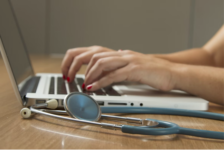The novelty of medical technology is without dispute. In all except the most extreme medical emergencies, such as a broken bone, we rely on modern medical technology. Technology has always been present and undeniable, from plaster to robotic surgery. Nonetheless, the patient is the driving force behind all advances in medicine
Enhanced Electronic Health Records
Several fundamental aspects of medical care have been enhanced by technological developments over the years. The widespread adoption of electronic health records is one example. Paper file systems for patient records are so last century; they made it difficult for doctors at different hospitals to work together on patient care. The Electronic Health Record (EHR) adoption rate has increased since the Health Information
The Technology for Economic and Clinical Health (HITECH) Act was passed. Providers may streamline many parts of patient care with the use of EHRs, even while the healthcare system as a whole is still working through existing hurdles linked to interoperability. By giving doctors a more complete view of a patient’s health history, EHRs are transforming healthcare around the world and allowing for more nuanced, individualized treatment plans.
Personalized Treatment
The utilization of devices and wearable technologies to boost patient participation is just another manner in which technology is advancing the healthcare system. Insight from such gadgets can be used to develop hyper-specific, individualized approaches to health and fitness. For instance, you could use Medical Wave for brand of the best shockwave technology to streamline the healing process.
Care, coaching, and health suggestions can be made that are tailored specifically to an individual’s ailments, aspirations, and way of life through the use of data analysis. Understanding the individual and their unique motivations, and then tailoring solutions to that person’s way of life in small, digestible pieces is preferable than presenting a prepackaged piece of content that fits a broad answer to a health system.
Greater Patient Care
Technology can improve patient participation, which in turn can help doctors develop more precise, individualized treatment regimens. Wearables such as fitness bands and other wirelessly connected gadgets can monitor one’s blood pressure and Electrocardiograph (ECG), providing patients and specialists with access to individualized data. These gadgets can display data including calorie intake, activity status, scheduled tasks, blood pressure readings, and more.
The health of their patients, including their compliance with treatment programs, may be monitored more effectively by specialists. This is especially important for older patients or those who live alone, as their loved ones or concerned medical professionals will be notified immediately if anything out of the ordinary is noticed. These technology aids guarantee first-rate service for patients, raising the bar for everyone’s healthcare.
Reduction in Medical Errors
Because they occur so frequently and are an inevitable byproduct of human performance, medical errors are becoming an increasing public concern. The development of systems that have been shown to decrease medical errors and increase survival rates has been helped, thankfully, by technological advancements. The clinical decision support (CDS) system supplies the doctor with general medical data and individual patient details.
The goal is to improve the healthcare provider’s decision-making process by filtering relevant information and presenting it at key moments. Evidence-based standards and advice; processes and protocols; regulations and suggestions for care, etc. are all within its purview. As the CDS system has been shown to decrease both major and total drug errors, it is clear that such a system has the potential to significantly improve healthcare.
Endnote
Technology is revolutionizing the healthcare industry in so many beneficial ways. Be sure to invest in the right technology because health is a vulnerable aspect of human lives.
Written by Adam Eaton








